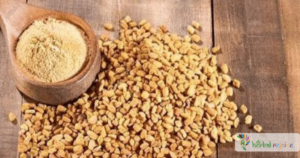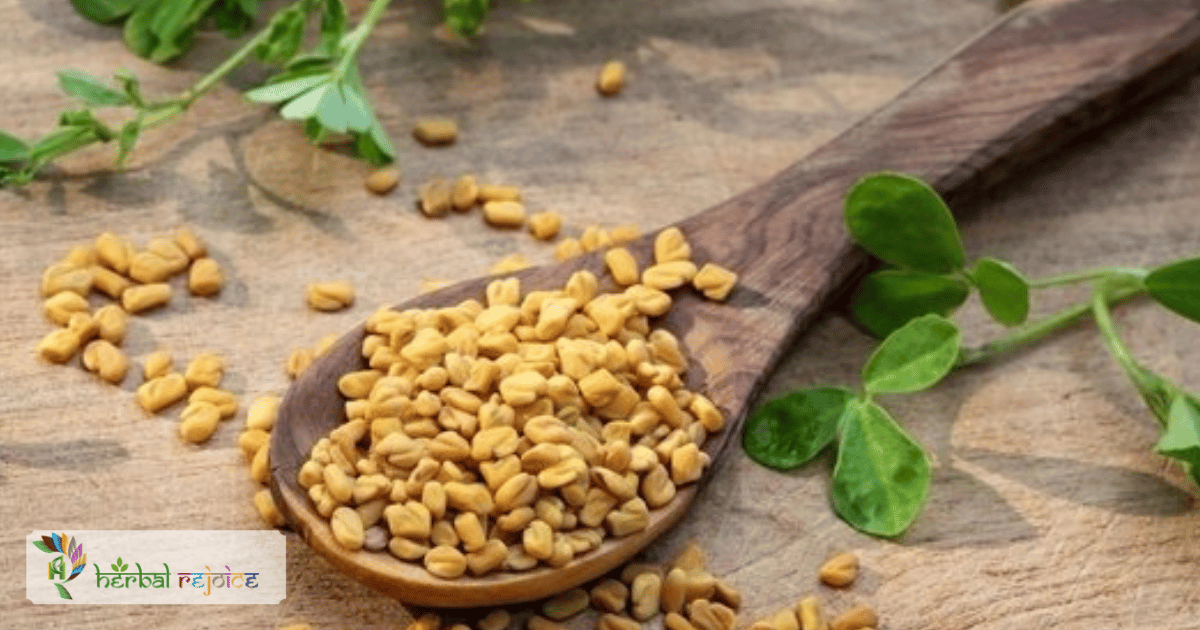Introduction
Fenugreek (Trigonella foenum-graecum Linn.) is a plant widely cultivated in many parts of India.
Fenugreek seeds have been traditionally used for their medicinal properties.
They are known to be effective in treating loss of appetite, flatulence, dyspepsia, colic, diarrhea, dysentery, and enlargement of the liver and spleen. They are also used as a galactagogue and puerperal tonic.
Fenugreek – A Hair Growth Stimulant

Names and Habitat Of Fenugreek
It has various names in different traditional systems of medicine.
In Ayurveda, it is known as Methikaa, Methi, Vastikaa, Selu, Methini, Dipani, Bahupatrikaa, Bodhaini, and Gandhaphala.
In Unani medicine, it is called Hulbaa and Methi, and in Siddha/Tamil medicine, it is known as Vendhayam.
Traditional Uses Of Fenugreek
Recent research has shown that fenugreek seeds have secretolytic, hyperemic, and mild antiseptic properties. The British Herbal Pharmacopoeia has reported that fenugreek seeds have demulcent and hypoglycemic actions.
The European Scientific Cooperative on Phytotherapy (ESCOP) and the World Health Organization (WHO) have also listed fenugreek seeds as a recommended adjuvant therapy for diabetes mellitus, anorexia, and hypercholesterolemia.
Chemical Constituents Of Fenugreek
Fenugreek seeds contain various bioactive compounds, including alkaloids such as trigonelline, gentianine, and carpaine.
They also contain saponins, mainly based on the sapogenins diosgenin, yamogenin, gitogenin, and tigogenin.
Flavonoids like vitexin and its glycosides and esters, as well as luteolin, can also be found in fenugreek seeds.
Additionally, fenugreek seeds contain a small amount of volatile oil. The mucilage in fenugreek seeds is mostly composed of a galactomannan.
Key Components Of Fenugreek
One of the notable compounds found in fenugreek seeds is 4-hydroxyisoleucine, which makes up about 80% of the total content of free amino acids in the seeds. This compound has been found to directly stimulate insulin production.
Fenugreek seeds also contain fenugreekine, a C-steroidal sapogenin peptide ester that exhibits hypoglycemic activity.
Saponin-rich extracts from fenugreek seeds have been shown to reduce blood levels of cholesterol, while the fibrous fraction of the seeds can lower blood lipids.
Potential Health Benefits
The aqueous extract of fenugreek seeds has demulcent properties and has been shown to promote healing of gastric ulcers in rats. It also has a smooth muscle relaxing effect in rabbits without affecting the heart or blood pressure.
Fenugreek has been reported to stimulate the liver microsomal cytochrome P450-dependent aryl hydroxylase and cytochrome b5 in rats, and increased bile secretion has been observed.
Fenugreek extract containing trigonelline and trigonellic acid may be used as a hair growth stimulant.
Dosage Of Fenugreek
The recommended dosage of fenugreek seed powder is 3-5 grams.
Frequenty Asked Questions (FAQs)
What is fenugreek?
Fenugreek is a plant widely cultivated in India with various names in different traditional systems of medicine.
What are the names of fenugreek in Ayurveda?
In Ayurveda, fenugreek is known as Methikaa, Methi, Vastikaa, Selu, Methini, Dipani, Bahupatrikaa, Bodhaini, and Gandhaphala.
What are the medicinal uses of fenugreek seeds?
Fenugreek seeds have been used to treat loss of appetite, flatulence, dyspepsia, colic, diarrhea, dysentery, and enlargement of the liver and spleen. They are also used as a galactagogue and puerperal tonic.
What are the recent findings about fenugreek seeds?
Recent research has shown that fenugreek seeds have secretolytic, hyperemic, and mild antiseptic properties.
What actions do fenugreek seeds have according to the British Herbal Pharmacopoeia?
According to the British Herbal Pharmacopoeia, fenugreek seeds have demulcent and hypoglycemic actions.
What conditions are fenugreek seeds recommended for?
The European Scientific Cooperative on Phytotherapy (ESCOP) and the World Health Organization (WHO) recommend fenugreek seeds as an adjuvant therapy for diabetes mellitus, anorexia, and hypercholesterolemia.
What are the bioactive compounds found in fenugreek seeds?
Fenugreek seeds contain alkaloids, saponins, flavonoids, volatile oils, and a galactomannan mucilage.
What are the benefits of 4-hydroxyisoleucine in fenugreek seeds?
4-hydroxyisoleucine in fenugreek seeds stimulates insulin production and acts as a hypoglycemic compound.
What is fenugreekine and what does it do?
Fenugreekine is a C-steroidal sapogenin peptide ester found in fenugreek seeds that exhibits hypoglycemic activity.
How can fenugreek seeds lower blood cholesterol levels?
Saponin-rich extracts from fenugreek seeds have been shown to reduce blood levels of cholesterol.
What healing properties does the aqueous extract of fenugreek seeds have?
The aqueous extract of fenugreek seeds has demulcent properties and promotes healing of gastric ulcers.
Does fenugreek have any effects on smooth muscle?
Fenugreek has a smooth muscle relaxing effect in rabbits without affecting the heart or blood pressure.
How does fenugreek affect the liver?
Fenugreek stimulates the liver microsomal cytochrome P450-dependent aryl hydroxylase and cytochrome b5 in rats, and increased bile secretion has been observed.
Can fenugreek be used for hair growth?
Fenugreek extract containing trigonelline and trigonellic acid may be used as a hair growth stimulant.
What is the recommended dosage of fenugreek seed powder?
The recommended dosage of fenugreek seed powder is 3-5 grams.
Is fenugreek safe to use?
Fenugreek is generally considered safe when used in moderate amounts. However, it may cause allergic reactions in some individuals.
Can fenugreek interact with medications?
Fenugreek can interact with certain medications, such as anticoagulants and antiplatelet drugs, due to its blood-thinning properties.
Are there any side effects of fenugreek?
Some people may experience gastrointestinal discomfort, diarrhea, or a maple syrup-like odor in their urine when consuming fenugreek.
Can fenugreek be used during pregnancy or breastfeeding?
It’s best to consult with a healthcare professional before using fenugreek during pregnancy or breastfeeding, as its safety during these stages is not well-established.
Where can I purchase fenugreek seeds?
Fenugreek seeds can be found at health food stores, specialty spice shops, and online retailers.





